人教版(2019)选择性必修第二册Unit 5 First Aid Discover Useful Structures 非谓语动词用法课件(共59张PPT)
文档属性
| 名称 | 人教版(2019)选择性必修第二册Unit 5 First Aid Discover Useful Structures 非谓语动词用法课件(共59张PPT) | 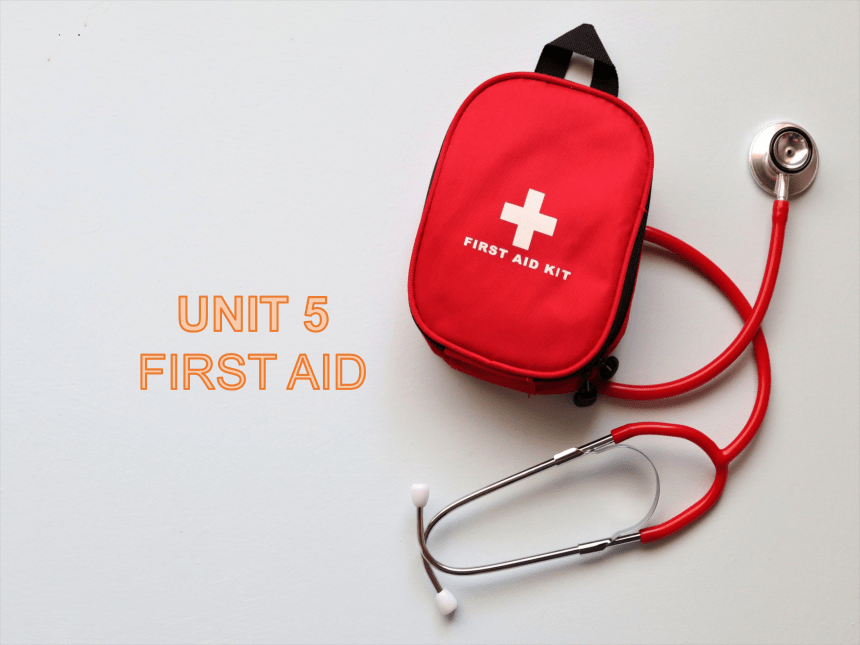 | |
| 格式 | pptx | ||
| 文件大小 | 4.7MB | ||
| 资源类型 | 教案 | ||
| 版本资源 | 人教版(2019) | ||
| 科目 | 英语 | ||
| 更新时间 | 2024-03-16 12:32:13 | ||
图片预览

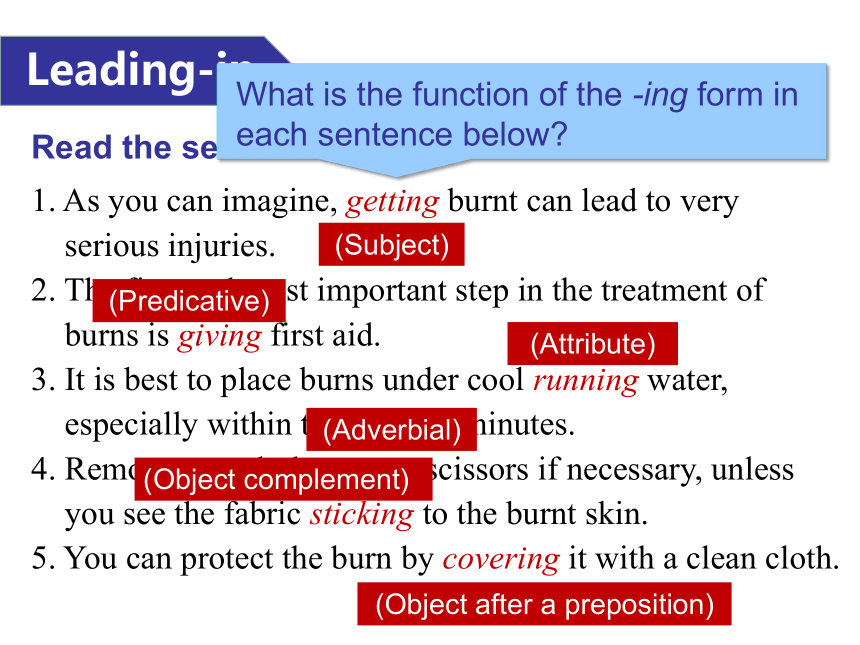

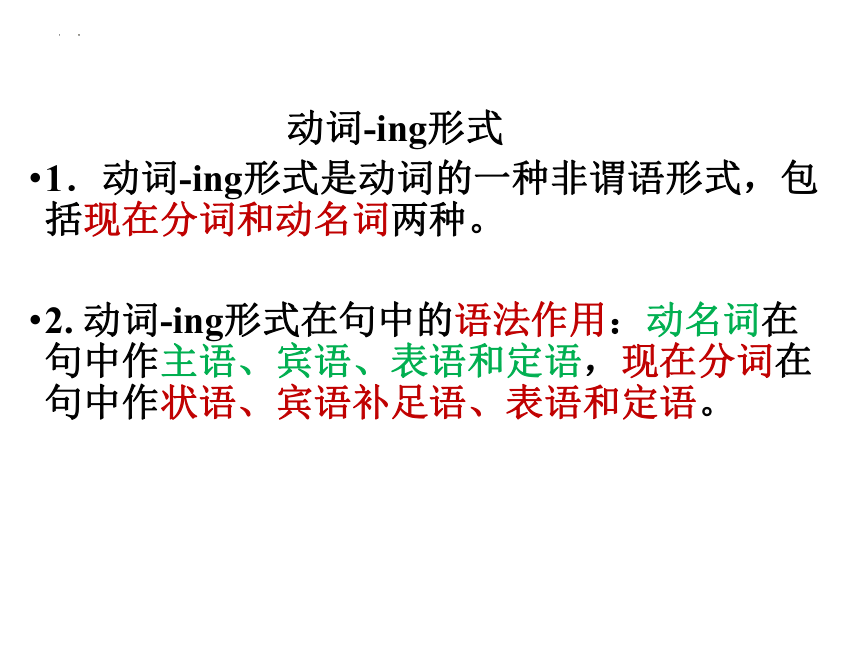

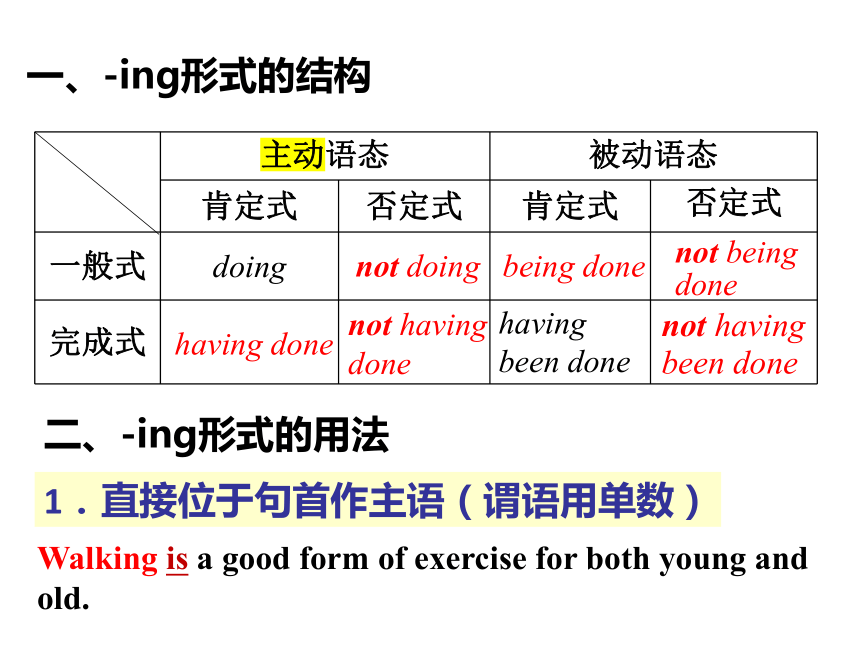
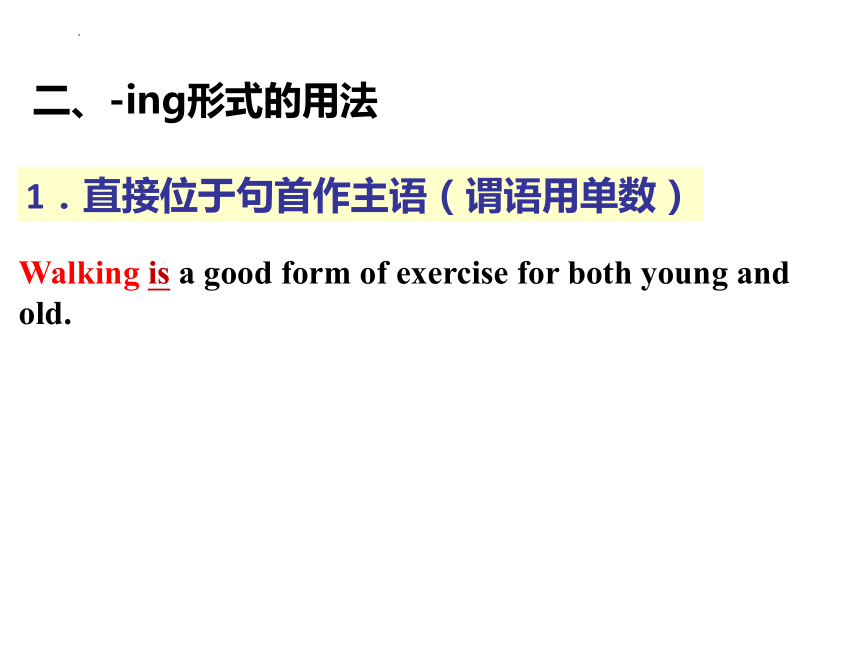
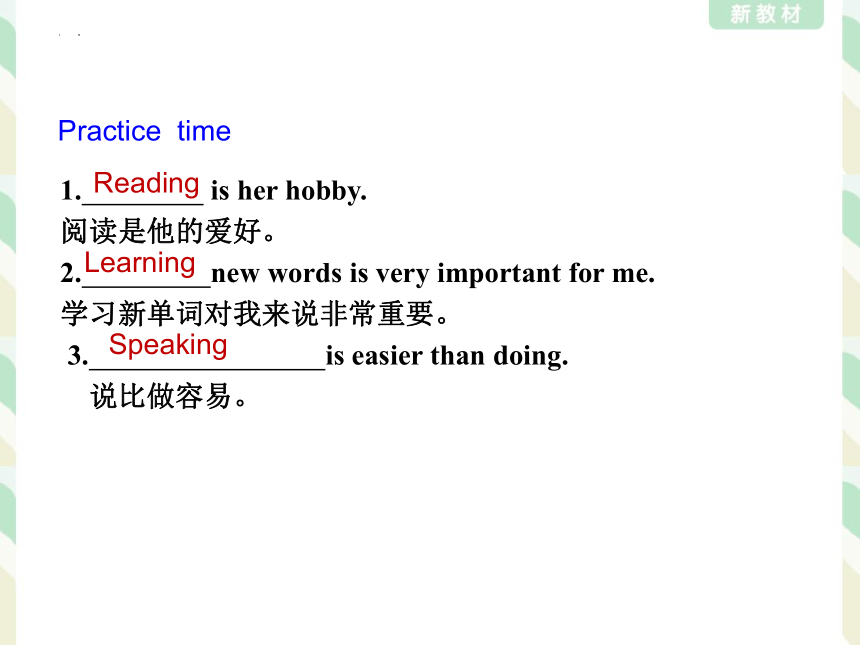
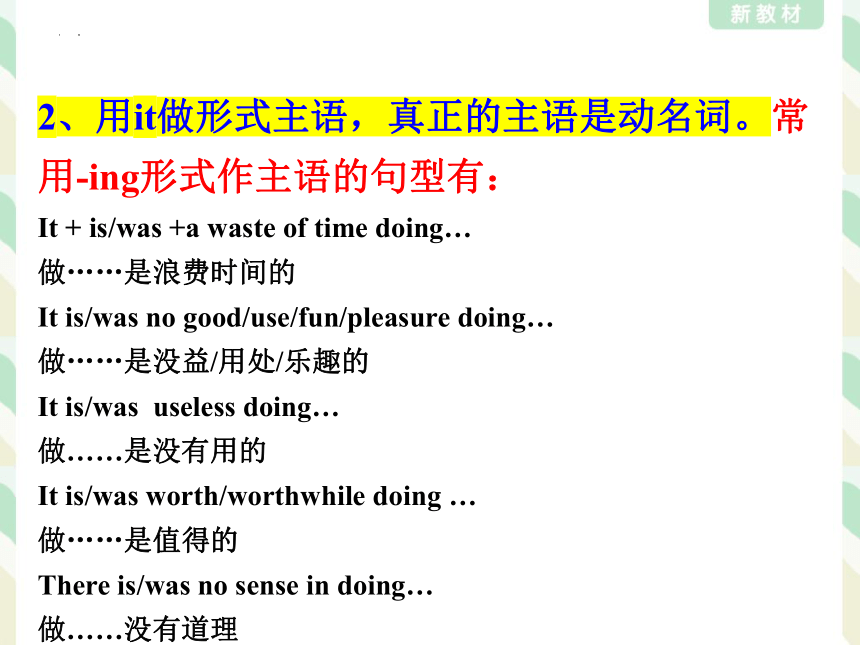

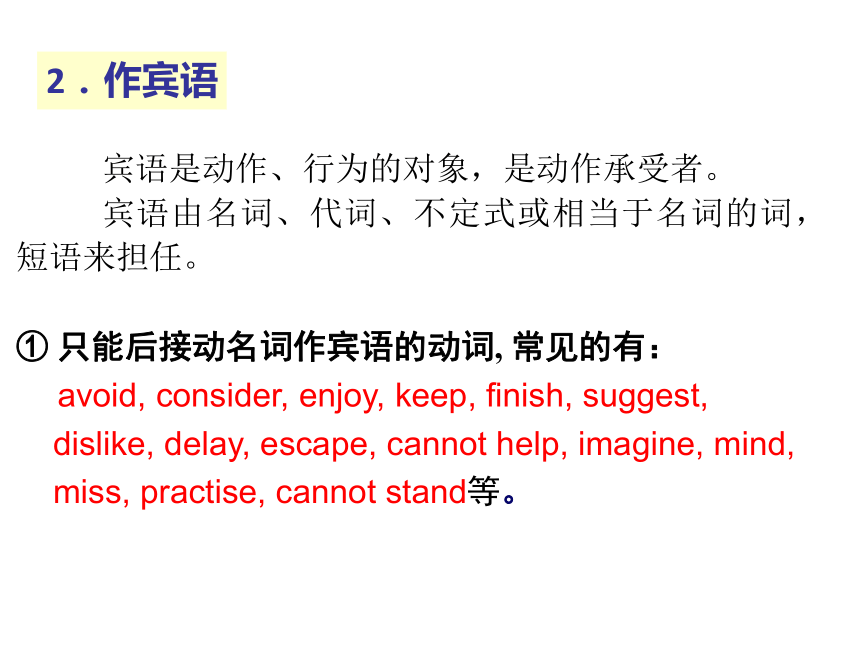
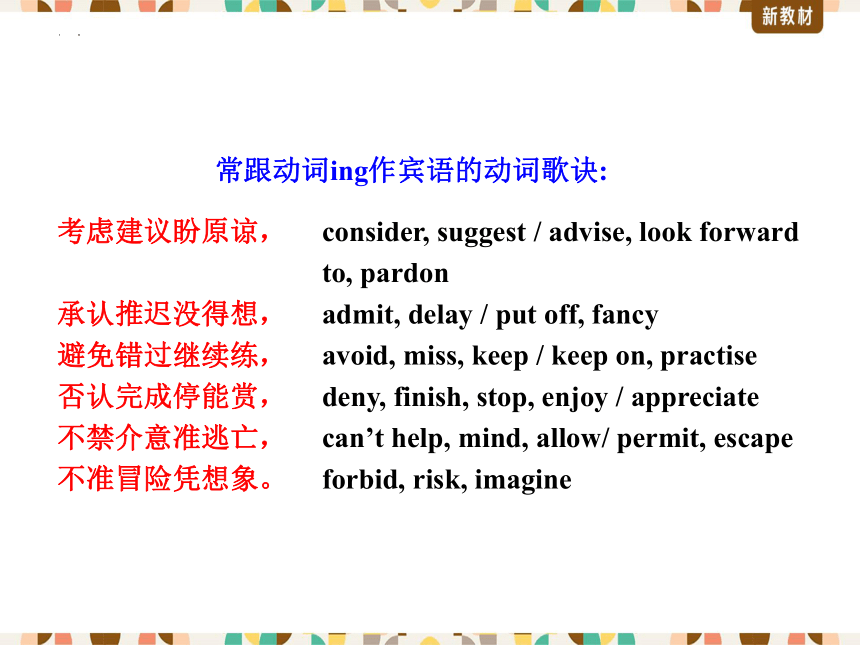
文档简介
(共59张PPT)
UNIT 5
FIRST AID
Leading-in
Read the sentences below.
1. As you can imagine, getting burnt can lead to very
serious injuries.
2. The first and most important step in the treatment of
burns is giving first aid.
3. It is best to place burns under cool running water,
especially within the first ten minutes.
4. Remove any clothes using scissors if necessary, unless
you see the fabric sticking to the burnt skin.
5. You can protect the burn by covering it with a clean cloth.
What is the function of the -ing form in each sentence below
(Subject)
(Predicative)
(Object after a preposition)
(Attribute)
(Adverbial)
(Object complement)
复习动词-ing形式
课本P53,导学案P174
Review of the -ing form
Presentation
动词 ing形式
1.动词 ing形式是动词的一种非谓语形式,包括现在分词和动名词两种。
2. 动词 ing形式在句中的语法作用:动名词在句中作主语、宾语、表语和定语,现在分词在句中作状语、宾语补足语、表语和定语。
v-ing功能分类
v-ing形式
动名词
现在分词
主语
宾语
表语
定语
定语
表语
状语
宾补
Playing with fire is dangerous.
Jim likes jumping in muddy puddles.
Her idea is building up a new company.
People living there are quite friendly.
He really needs a washing machine.
The performance was really amazing.
Laughing and talking, they went in.
I love to watch her performing on the stage.
主动语态 被动语态
肯定式 否定式 肯定式 否定式
一般式 doing
完成式 having been done
一、-ing形式的结构
not doing
being done
not being done
having done
not having done
not having been done
二、-ing形式的用法
1.直接位于句首作主语(谓语用单数)
Walking is a good form of exercise for both young and
old.
二、-ing形式的用法
1.直接位于句首作主语(谓语用单数)
Walking is a good form of exercise for both young and
old.
1. is her hobby.
阅读是他的爱好。
2. new words is very important for me.
学习新单词对我来说非常重要。
3. is easier than doing.
说比做容易。
Practice time
Reading
Learning
Speaking
2、用it做形式主语,真正的主语是动名词。常用-ing形式作主语的句型有:
It + is/was +a waste of time doing…
做……是浪费时间的
It is/was no good/use/fun/pleasure doing…
做……是没益/用处/乐趣的
It is/was useless doing…
做……是没有用的
It is/was worth/worthwhile doing …
做……是值得的
There is/was no sense in doing…
做……没有道理
1.It is no use (wait)for him any longer.
2. It is useless _______(try) to explain.
3. It is a waste of time and money _______ (see) that movie.
4. There is no good / use (in) _______ (argue) with him.
waiting
trying
seeing
arguing
2.作宾语
① 只能后接动名词作宾语的动词, 常见的有:
avoid, consider, enjoy, keep, finish, suggest,
dislike, delay, escape, cannot help, imagine, mind,
miss, practise, cannot stand等。
宾语是动作、行为的对象,是动作承受者。
宾语由名词、代词、不定式或相当于名词的词,短语来担任。
常跟动词ing作宾语的动词歌诀:
考虑建议盼原谅,
承认推迟没得想,
避免错过继续练,
否认完成停能赏,
不禁介意准逃亡,
不准冒险凭想象。
consider, suggest / advise, look forward to, pardon
admit, delay / put off, fancy
avoid, miss, keep / keep on, practise
deny, finish, stop, enjoy / appreciate
can’t help, mind, allow/ permit, escape
forbid, risk, imagine
② 既可接动名词又可接不定式作宾语的动词
A.接doing 和to do意思基本相同的常见的有:
like, love, hate, prefer, continue, begin/start
B 以下及物动词后既可接不定式又可接v. ing作宾语,但两者意义上有区别。
(1)remember to do sth记得要去做某事(没有做)
remember doing sth记得做过某事 (已经做了)
I remember to meet her at the station.
我记得要去车站接她。
I remember turning off the light .
我记得我关了灯。
(2)forget to do sth忘记要去做某事( 没有做)
forget doing sth忘记做过某事(已经做过)
I forgot to tell you about it. Now here it is.
我忘记告诉你这件事了,是这样的。
I forgot giving it to you yesterday.
我忘记昨天已经把它给你了。
(3) regret to do sth 很遗憾/抱歉地去做某事 (将要做)
regret doing sth 后悔做了某事(已经做了)
we regret to inform you that your application has not been successful.
我们很遗憾的通知您,您的申请没有通过。
I regret not working hard
我后悔没有努力学习。
(4)can't help to do sth 不能帮着去做某事
can't help doing sth 禁不住做某事
I can't help to clean the house with so much work to do.
我有太多工作要做,不能帮着收拾屋子。
She can't help laughing at the thought of the joke he told her.
一想到他讲的笑话,她禁不住大笑。
go on to do 接着做另一件事
go on doing 继续做同一件事
stop to do 停下来(做别的事)
stop doing 停止做某事
其他。对比分析:
try to do 努力做某事
try doing 试着做某事
used to do sth 过去常常做某事
be used to doing sth 习惯做某事
mean to do 打算做某事
mean doing 意味着做某事
③ 作介词宾语
We’ve got to think of ways of changing people’s habits.
I apologize for being so angry with you.
I insist on taking proper food for this trip.
页码 21
动词-ing形式作介词的宾语。注意: insist on, object to, lead to, put off, give up, be/get used to, look forward to, feel like, pay attention to, stick to, devote to等中的to都是介词而不是动词不定式符号。
I’m looking forward to_________(receive) your letter.
receiving
He stopped ________ (smoke) and have a rest.
He really must stop_________ (smoke).
3)—The light in the office is still on.
—Oh,I forgot ______________(turn) it off.
4)The light in the office is off, but she forgets_________ (turn) it off.
5)Would you mind ________(move) the box for me
6)We are all looking forward to _____ (visit) the museum soon.
to smoke
smoking
to turn
to learn
Practice time
turning
moving
visiting
7) I can’t help ________ (clean) the room, for I am too busy.
8) After hearing the joke, we can’t help _________ (laugh).
9) Though it rained, they went on _________ (work).
10) We have finished Part 1. Let’s go on _________ (learn) Part 2.
to clean
laughing
working
to learn
页码 24
即:need/require/want/deserve doing =need/require/want/deserve to be done
For example:
These clothes need washing.=
These clothes need _____________________.
The requires _________________.
=The houhouse se requires to be repaired.
在动词need, require, want, deserve后,用动词-ing形式表示被动含义
to be washed
repairing
主动表被动
3.作表语
V-ing形式做表语,意为“令人…..的”。此时的v-ing的功能相当于形容词,说明人或物所具备的特征。
The music is very interesting to the ear.
这段音乐非常的悦耳。
This dog is frightening.
这条狗令人害怕。
V+ed 形式做表语表示主语所处的状态或主语的感受,常被译为“感到…..的”
The boy’s exam results were disappointing . His parents felt disappointed.
V-ing 主语一般是物
V-ed 主语一般是人
当被修饰的名词时face,smile, look, voice 等能表现出人的感情的名词时,通常用-ed等形式的形容词
A worried look 焦虑的神色
An excited voice激动的声音
区别
It is believed that if a book is _________ (interest), it will surely interest the reader.
3.The news was __________ (shock), and there was a __________ (frighten) look on her face.
interesting
shocking
frightened
inspiring
Her job is teaching.
Teaching is her job.
His task is _____________ (answer) the phone.
Tom' s duty is ____________(clean) the classroom.
answering
cleaning
V-ing作动名词时,作表语体现的是名词的特征,用于对主语的内容进行解释说明,往往表示主语所具有的特征,且主语和表语可以互换。
a sleeping car
动名词作定语表示被修饰词的某种________或________,不表示名词本身的动作, 相当于for引导的介词短语。
=
功能
用途
a car for sleeping
4.作定语
动名词作定语
a pool for swimming
a __________pool
=
swimming
a __________room
=
a room for reading
reading
-ing作定语的意义
现在分词作定语
a sleeping boy
现在分词作定语,表示被修饰词的_______或__________。现在分词与被修饰的词为_______关系,或___________。
=
状态
a boy who is sleeping
动作
主动
正在进行
-ing作定语的位置
1.单个的现在分词作定语时,通常位于它所修饰的名词或代词_____。
前面
a flying bird
boiling water
a burning house
-ing作定语的位置
注意:单个的现在分词修饰复合不定代词something, everything, anything, nothing等,要放在这些词的_______。
后面
I have something interesting to say.
2. Anything amazing is welcomed here.
a sleeping dog
一只睡觉的狗狗
Translation
一棵正在倒下的树
a falling tree
Translation
a swimming pig
a dancing girl
一个跳舞的女孩
一个游泳的小猪
② –ing 形式短语作定语时,放在所修饰的名词之后,
并且在意思上相当于一个定语从句。
They lived in a room facing the street.
= They lived in a room that faces the street.
The man standing there is Peter’s father.
= The man who is standing there is Peter’s father.
3. -ing形式短语也可以用作非限制定语,相当于一个
非限制性定语从句,这时,它与句子其他部分用逗
号分开。
His brother, working as a teacher, lives in Beijing.
= His brother, who is working as a teacher, lives in Beijing.
辨析
The______(injure) workers are now being taken good care of in the hospital.
injured
This will be the best novel of its kind ever _____(write).
written
The witnesses___(question) by the police just now gave very different descriptions of the fight.
questioned
The police ___(question) the witnesses just now required them to give descriotions of the fight.
questioning
1) 动 词 –ing 形 式 作 宾 语 补 足 语 常 放 在 宾语 后 面 ,表 示一个 正 在 进 行 的 主 动 性 的 动 作,或存在的状态。
When we returned to the school, we found a stranger standing at the entrance.
I found a bird singing in the tree.
5.V-ing形式作宾语补足语
能用-ing形式作宾语补足语的几类动词:
A. 表示感觉和心理状态的动词, 常见的有see(看), hear, (听见) feel, (感觉)smell(闻), find(发现), notice(注意), observe(注意到), look at(看), listen to(听)等+sb+ doing sth(作宾补)
I saw him walking in the street.
我看见他在街上走。
I heard them singing in the classroom.
我听见他们在教室里唱歌。
We found the boy sleeping. 我们发现小孩睡着了。
能用-ing形式作宾语补足语的几类动词:
B. 表示“使,令,让,帮,叫”等意义的动词(使役动词), 常见的有 make, have, let, set, keep, get, leave等+sb /sth+doing sth (宾补)
I won’t have you doing that.
This set me thinking.
I’m sorry to have kept you waiting.
We kept the fire burning all the night long .
C.作介词 with 的宾补,在 “with+ 宾语 +doing” 结
构中,doing 表示主动或进行。
With the final exam approaching,the students are studying harder.
【注】
“with+ 宾语 +done”表示被动或完成;
“with+ 宾语 +to do”表示尚未发生。
He lay in bed with his eyes focused on the ceiling.
他躺在床上,眼睛盯着天花板。
With an interview to take,he felt a little nervous.
要参加面试,他感到有点儿紧张。
(1)We shouldn’t keep him (continue)to waste his time playing games.
(2) When I came in,I saw Linda (comfort) the crying girl.
(3) He was just about to sit down when he felt something ___________ (move)near his feet.
(4) The living room is clean and tidy,with a Christmas tree _________(stand)in the middle.
(4) The living room is clean and tidy ,with a Christmas tree _________(decorate) uniquely standing in the middle.
Practice time
continuing
comforting
moving
standing
decorated
Being a student, you should study hard.
He sat on the sofa, watching TV.
While waiting for the bus, he read a copy of China Daily.
The song is sung all over the country, making it the most popular song.
Walking ahead, you will see a white house.
Admitting what you say, I still think you are wrong.
6.作状语
表示动作发生的原因、时间、方式、结果、条件、伴随状况等。其前可加连词while, when,(当) once,(曾经) if(如果),unless (除非)等。
表原因
表伴随
表时间
表结果
表条件
表让步
1.作时间状语(相当于一个时间状语从句)
Walking in the park ,she saw an old friend .
当她在公园散步时,她看到了她的一个老朋友。
注意:表示正在进行的动作时,可直接在分词前加上when /while,此时也可理解为状语从句的省略
2.作原因状语(一般可转换成由as 或because引导的原因状语从句)
Being ill,he couldn’t go to school.
因为生病了,他无法去上学。
3.作条件状语(一般放在句首,可转换成由if, unless等连词引导的条件状语从句)
Working hard ,you’ll make great progress.
如果你努力工作,你将取得很大进步。
4.作结果状语(现在分词作状语时,常放在句末,表示一种顺其自然、意料之中得结果。)
The hospital has recently obtained new medical equipment, allowing more patients to be treated .
这家医院最近新得到一批新的医疗设备,这使更多的病人能得到治疗。
5.作让步、方式和伴随状语(现在分词作让步、方式、和伴随状语时,说明动作发生的背景和情况。作伴随状语时,表示分词的动作和主句的动作同时发生,此时它可转换成并列句。)
Mary sat by the window of the classroom , reading a book
=Mary sat by the window of the classroom and was reading a book
当现在分词的动作先发生,而谓语动词的动作后发生时,用分词的完成式。
Having finished the letter , he went to post it.
他写完信后就把它寄出去了。
Not knowing this ,he didn’t come.
他不知道这件事,所以没来。
Practice time
1.__________ (walk)the street one day, she met an old friend of hers.
(Turn)to the right ,you’ll find the children’s ward there.
3.While (wait) for the bus, he read a copy of China Daily.
4. After she had finished her homework, the little
girl began to watch TV.
_____________ her homework, the little girl
began to watch TV.
Walking
Turning
waiting
Having finished
1. Because he was ill, he didn’t go to school.
______, he didn’t go to school.
2. When she was walking along the street one day, she met an old friend of hers.
___________ the street one day, she met an old friend of hers.
3. If it is sunny, we’ll go for a picnic tomorrow.
___________, we’ll go for a picnic tomorrow.
Practice
Being ill
Walking along
每空填一词, 使该句与所给句子的意思相同。
It being sunny
4. After she had finished her homework, the little
girl began to watch TV.
_____________ her homework, the little girl
began to watch TV.
5. Because they had been warned by the teacher,
they didn’t make such mistakes.
_________________ by the teacher, they didn’t
make such mistakes.
6. As it was a holiday, all the shops were shut.
________________, all the shops were shut.
It being a holiday
Having finished
Having been warned
课本 P53 exercises
Replace each underlined part with a suitable -ing form and rewrite the sentence as necessary.
1. When he got out of the bathtub, he slipped and fell
on the floor.
2. Is there any reason why we are not going to have
the first-aid training this week
3. She had been told about the risk of electric shocks
and this made her very careful while using
hairdryers.
When getting out of the bathtub, he slipped and fell on the floor.
Is there any reason for not having the first-aid training this week
Replace each underlined part with a suitable -ing form and rewrite the sentence as necessary.
4. Because the child was not watched carefully by his
parents, he touched a hot iron and burnt his finger.
5. After she had been bitten by mosquitoes, she
applied some medicine to her skin.
Having been told about the risk of electric shocks, she was very careful while using hairdryers.
Not being watched carefully by his parents, the child touched a hot iron and burnt his finger.
After being/ having been bitten by mosquitoes, she applied some medicine to her skin.
Complete the passage with the correct forms of the given words. What happened to Mrs Taylor
Production
Mrs Taylor was an elderly woman ______ (live) alone. One day, she was in her living room cleaning the windows, when suddenly she could no longer feel the right side of her body. _____ (try) to walk to her sofa to sit down, she fell over onto the carpet. Then she realised that she could not get up, and that she was having trouble ________ (breathe). Fortunately, she had her mobile phone with her, and she was able to reach it with her left hand while _____ (lie) on the floor. Her mobile phone _______________ (already, set up) to call an emergency number at the push of
living
Trying
breathing
lying
was already set up
a button, so it was easy to call for help. While attempting to talk to the operator, Mrs Taylor discovered that she could not speak. _________ (not, hear) an answer, the operator knew that Mrs Taylor must be in trouble. Telling Mrs Taylor that everything would be OK, she immediately sent an ambulance. After ________ (arrive), the ambulance team quickly found Mrs Taylor and without delay gave her oxygen, put in an IV needle, and checked her vital signs. ______________ (take) to the hospital and treated immediately, Mrs Taylor's health was in no great danger, though she had to stay in the hospital ward. After a week, her ________ (frighten) experience was over, and she was allowed to go home.
Not hearing
arriving
Having been taken
frightening
Work in pairs and discuss the following questions.
1. What should people do when facing a frightening
experience like Mrs Taylor's
When having a frightening experience like Mrs Taylor’s, people should try to get help, like she did.
2. What are some risks that elderly people may
encounter when living alone
When living alone, elderly people may fall or get injured, and not be able to help themselves or even call for help.
3. What can we do to help prevent elderly people
from taking unnecessary risks
To help prevent elderly people from taking unnecessary risks, we should make sure that their homes are easy to get around in, with handrails, ramps 坡道instead of stairs, and even walking surfaces.
UNIT 5
FIRST AID
Leading-in
Read the sentences below.
1. As you can imagine, getting burnt can lead to very
serious injuries.
2. The first and most important step in the treatment of
burns is giving first aid.
3. It is best to place burns under cool running water,
especially within the first ten minutes.
4. Remove any clothes using scissors if necessary, unless
you see the fabric sticking to the burnt skin.
5. You can protect the burn by covering it with a clean cloth.
What is the function of the -ing form in each sentence below
(Subject)
(Predicative)
(Object after a preposition)
(Attribute)
(Adverbial)
(Object complement)
复习动词-ing形式
课本P53,导学案P174
Review of the -ing form
Presentation
动词 ing形式
1.动词 ing形式是动词的一种非谓语形式,包括现在分词和动名词两种。
2. 动词 ing形式在句中的语法作用:动名词在句中作主语、宾语、表语和定语,现在分词在句中作状语、宾语补足语、表语和定语。
v-ing功能分类
v-ing形式
动名词
现在分词
主语
宾语
表语
定语
定语
表语
状语
宾补
Playing with fire is dangerous.
Jim likes jumping in muddy puddles.
Her idea is building up a new company.
People living there are quite friendly.
He really needs a washing machine.
The performance was really amazing.
Laughing and talking, they went in.
I love to watch her performing on the stage.
主动语态 被动语态
肯定式 否定式 肯定式 否定式
一般式 doing
完成式 having been done
一、-ing形式的结构
not doing
being done
not being done
having done
not having done
not having been done
二、-ing形式的用法
1.直接位于句首作主语(谓语用单数)
Walking is a good form of exercise for both young and
old.
二、-ing形式的用法
1.直接位于句首作主语(谓语用单数)
Walking is a good form of exercise for both young and
old.
1. is her hobby.
阅读是他的爱好。
2. new words is very important for me.
学习新单词对我来说非常重要。
3. is easier than doing.
说比做容易。
Practice time
Reading
Learning
Speaking
2、用it做形式主语,真正的主语是动名词。常用-ing形式作主语的句型有:
It + is/was +a waste of time doing…
做……是浪费时间的
It is/was no good/use/fun/pleasure doing…
做……是没益/用处/乐趣的
It is/was useless doing…
做……是没有用的
It is/was worth/worthwhile doing …
做……是值得的
There is/was no sense in doing…
做……没有道理
1.It is no use (wait)for him any longer.
2. It is useless _______(try) to explain.
3. It is a waste of time and money _______ (see) that movie.
4. There is no good / use (in) _______ (argue) with him.
waiting
trying
seeing
arguing
2.作宾语
① 只能后接动名词作宾语的动词, 常见的有:
avoid, consider, enjoy, keep, finish, suggest,
dislike, delay, escape, cannot help, imagine, mind,
miss, practise, cannot stand等。
宾语是动作、行为的对象,是动作承受者。
宾语由名词、代词、不定式或相当于名词的词,短语来担任。
常跟动词ing作宾语的动词歌诀:
考虑建议盼原谅,
承认推迟没得想,
避免错过继续练,
否认完成停能赏,
不禁介意准逃亡,
不准冒险凭想象。
consider, suggest / advise, look forward to, pardon
admit, delay / put off, fancy
avoid, miss, keep / keep on, practise
deny, finish, stop, enjoy / appreciate
can’t help, mind, allow/ permit, escape
forbid, risk, imagine
② 既可接动名词又可接不定式作宾语的动词
A.接doing 和to do意思基本相同的常见的有:
like, love, hate, prefer, continue, begin/start
B 以下及物动词后既可接不定式又可接v. ing作宾语,但两者意义上有区别。
(1)remember to do sth记得要去做某事(没有做)
remember doing sth记得做过某事 (已经做了)
I remember to meet her at the station.
我记得要去车站接她。
I remember turning off the light .
我记得我关了灯。
(2)forget to do sth忘记要去做某事( 没有做)
forget doing sth忘记做过某事(已经做过)
I forgot to tell you about it. Now here it is.
我忘记告诉你这件事了,是这样的。
I forgot giving it to you yesterday.
我忘记昨天已经把它给你了。
(3) regret to do sth 很遗憾/抱歉地去做某事 (将要做)
regret doing sth 后悔做了某事(已经做了)
we regret to inform you that your application has not been successful.
我们很遗憾的通知您,您的申请没有通过。
I regret not working hard
我后悔没有努力学习。
(4)can't help to do sth 不能帮着去做某事
can't help doing sth 禁不住做某事
I can't help to clean the house with so much work to do.
我有太多工作要做,不能帮着收拾屋子。
She can't help laughing at the thought of the joke he told her.
一想到他讲的笑话,她禁不住大笑。
go on to do 接着做另一件事
go on doing 继续做同一件事
stop to do 停下来(做别的事)
stop doing 停止做某事
其他。对比分析:
try to do 努力做某事
try doing 试着做某事
used to do sth 过去常常做某事
be used to doing sth 习惯做某事
mean to do 打算做某事
mean doing 意味着做某事
③ 作介词宾语
We’ve got to think of ways of changing people’s habits.
I apologize for being so angry with you.
I insist on taking proper food for this trip.
页码 21
动词-ing形式作介词的宾语。注意: insist on, object to, lead to, put off, give up, be/get used to, look forward to, feel like, pay attention to, stick to, devote to等中的to都是介词而不是动词不定式符号。
I’m looking forward to_________(receive) your letter.
receiving
He stopped ________ (smoke) and have a rest.
He really must stop_________ (smoke).
3)—The light in the office is still on.
—Oh,I forgot ______________(turn) it off.
4)The light in the office is off, but she forgets_________ (turn) it off.
5)Would you mind ________(move) the box for me
6)We are all looking forward to _____ (visit) the museum soon.
to smoke
smoking
to turn
to learn
Practice time
turning
moving
visiting
7) I can’t help ________ (clean) the room, for I am too busy.
8) After hearing the joke, we can’t help _________ (laugh).
9) Though it rained, they went on _________ (work).
10) We have finished Part 1. Let’s go on _________ (learn) Part 2.
to clean
laughing
working
to learn
页码 24
即:need/require/want/deserve doing =need/require/want/deserve to be done
For example:
These clothes need washing.=
These clothes need _____________________.
The requires _________________.
=The houhouse se requires to be repaired.
在动词need, require, want, deserve后,用动词-ing形式表示被动含义
to be washed
repairing
主动表被动
3.作表语
V-ing形式做表语,意为“令人…..的”。此时的v-ing的功能相当于形容词,说明人或物所具备的特征。
The music is very interesting to the ear.
这段音乐非常的悦耳。
This dog is frightening.
这条狗令人害怕。
V+ed 形式做表语表示主语所处的状态或主语的感受,常被译为“感到…..的”
The boy’s exam results were disappointing . His parents felt disappointed.
V-ing 主语一般是物
V-ed 主语一般是人
当被修饰的名词时face,smile, look, voice 等能表现出人的感情的名词时,通常用-ed等形式的形容词
A worried look 焦虑的神色
An excited voice激动的声音
区别
It is believed that if a book is _________ (interest), it will surely interest the reader.
3.The news was __________ (shock), and there was a __________ (frighten) look on her face.
interesting
shocking
frightened
inspiring
Her job is teaching.
Teaching is her job.
His task is _____________ (answer) the phone.
Tom' s duty is ____________(clean) the classroom.
answering
cleaning
V-ing作动名词时,作表语体现的是名词的特征,用于对主语的内容进行解释说明,往往表示主语所具有的特征,且主语和表语可以互换。
a sleeping car
动名词作定语表示被修饰词的某种________或________,不表示名词本身的动作, 相当于for引导的介词短语。
=
功能
用途
a car for sleeping
4.作定语
动名词作定语
a pool for swimming
a __________pool
=
swimming
a __________room
=
a room for reading
reading
-ing作定语的意义
现在分词作定语
a sleeping boy
现在分词作定语,表示被修饰词的_______或__________。现在分词与被修饰的词为_______关系,或___________。
=
状态
a boy who is sleeping
动作
主动
正在进行
-ing作定语的位置
1.单个的现在分词作定语时,通常位于它所修饰的名词或代词_____。
前面
a flying bird
boiling water
a burning house
-ing作定语的位置
注意:单个的现在分词修饰复合不定代词something, everything, anything, nothing等,要放在这些词的_______。
后面
I have something interesting to say.
2. Anything amazing is welcomed here.
a sleeping dog
一只睡觉的狗狗
Translation
一棵正在倒下的树
a falling tree
Translation
a swimming pig
a dancing girl
一个跳舞的女孩
一个游泳的小猪
② –ing 形式短语作定语时,放在所修饰的名词之后,
并且在意思上相当于一个定语从句。
They lived in a room facing the street.
= They lived in a room that faces the street.
The man standing there is Peter’s father.
= The man who is standing there is Peter’s father.
3. -ing形式短语也可以用作非限制定语,相当于一个
非限制性定语从句,这时,它与句子其他部分用逗
号分开。
His brother, working as a teacher, lives in Beijing.
= His brother, who is working as a teacher, lives in Beijing.
辨析
The______(injure) workers are now being taken good care of in the hospital.
injured
This will be the best novel of its kind ever _____(write).
written
The witnesses___(question) by the police just now gave very different descriptions of the fight.
questioned
The police ___(question) the witnesses just now required them to give descriotions of the fight.
questioning
1) 动 词 –ing 形 式 作 宾 语 补 足 语 常 放 在 宾语 后 面 ,表 示一个 正 在 进 行 的 主 动 性 的 动 作,或存在的状态。
When we returned to the school, we found a stranger standing at the entrance.
I found a bird singing in the tree.
5.V-ing形式作宾语补足语
能用-ing形式作宾语补足语的几类动词:
A. 表示感觉和心理状态的动词, 常见的有see(看), hear, (听见) feel, (感觉)smell(闻), find(发现), notice(注意), observe(注意到), look at(看), listen to(听)等+sb+ doing sth(作宾补)
I saw him walking in the street.
我看见他在街上走。
I heard them singing in the classroom.
我听见他们在教室里唱歌。
We found the boy sleeping. 我们发现小孩睡着了。
能用-ing形式作宾语补足语的几类动词:
B. 表示“使,令,让,帮,叫”等意义的动词(使役动词), 常见的有 make, have, let, set, keep, get, leave等+sb /sth+doing sth (宾补)
I won’t have you doing that.
This set me thinking.
I’m sorry to have kept you waiting.
We kept the fire burning all the night long .
C.作介词 with 的宾补,在 “with+ 宾语 +doing” 结
构中,doing 表示主动或进行。
With the final exam approaching,the students are studying harder.
【注】
“with+ 宾语 +done”表示被动或完成;
“with+ 宾语 +to do”表示尚未发生。
He lay in bed with his eyes focused on the ceiling.
他躺在床上,眼睛盯着天花板。
With an interview to take,he felt a little nervous.
要参加面试,他感到有点儿紧张。
(1)We shouldn’t keep him (continue)to waste his time playing games.
(2) When I came in,I saw Linda (comfort) the crying girl.
(3) He was just about to sit down when he felt something ___________ (move)near his feet.
(4) The living room is clean and tidy,with a Christmas tree _________(stand)in the middle.
(4) The living room is clean and tidy ,with a Christmas tree _________(decorate) uniquely standing in the middle.
Practice time
continuing
comforting
moving
standing
decorated
Being a student, you should study hard.
He sat on the sofa, watching TV.
While waiting for the bus, he read a copy of China Daily.
The song is sung all over the country, making it the most popular song.
Walking ahead, you will see a white house.
Admitting what you say, I still think you are wrong.
6.作状语
表示动作发生的原因、时间、方式、结果、条件、伴随状况等。其前可加连词while, when,(当) once,(曾经) if(如果),unless (除非)等。
表原因
表伴随
表时间
表结果
表条件
表让步
1.作时间状语(相当于一个时间状语从句)
Walking in the park ,she saw an old friend .
当她在公园散步时,她看到了她的一个老朋友。
注意:表示正在进行的动作时,可直接在分词前加上when /while,此时也可理解为状语从句的省略
2.作原因状语(一般可转换成由as 或because引导的原因状语从句)
Being ill,he couldn’t go to school.
因为生病了,他无法去上学。
3.作条件状语(一般放在句首,可转换成由if, unless等连词引导的条件状语从句)
Working hard ,you’ll make great progress.
如果你努力工作,你将取得很大进步。
4.作结果状语(现在分词作状语时,常放在句末,表示一种顺其自然、意料之中得结果。)
The hospital has recently obtained new medical equipment, allowing more patients to be treated .
这家医院最近新得到一批新的医疗设备,这使更多的病人能得到治疗。
5.作让步、方式和伴随状语(现在分词作让步、方式、和伴随状语时,说明动作发生的背景和情况。作伴随状语时,表示分词的动作和主句的动作同时发生,此时它可转换成并列句。)
Mary sat by the window of the classroom , reading a book
=Mary sat by the window of the classroom and was reading a book
当现在分词的动作先发生,而谓语动词的动作后发生时,用分词的完成式。
Having finished the letter , he went to post it.
他写完信后就把它寄出去了。
Not knowing this ,he didn’t come.
他不知道这件事,所以没来。
Practice time
1.__________ (walk)the street one day, she met an old friend of hers.
(Turn)to the right ,you’ll find the children’s ward there.
3.While (wait) for the bus, he read a copy of China Daily.
4. After she had finished her homework, the little
girl began to watch TV.
_____________ her homework, the little girl
began to watch TV.
Walking
Turning
waiting
Having finished
1. Because he was ill, he didn’t go to school.
______, he didn’t go to school.
2. When she was walking along the street one day, she met an old friend of hers.
___________ the street one day, she met an old friend of hers.
3. If it is sunny, we’ll go for a picnic tomorrow.
___________, we’ll go for a picnic tomorrow.
Practice
Being ill
Walking along
每空填一词, 使该句与所给句子的意思相同。
It being sunny
4. After she had finished her homework, the little
girl began to watch TV.
_____________ her homework, the little girl
began to watch TV.
5. Because they had been warned by the teacher,
they didn’t make such mistakes.
_________________ by the teacher, they didn’t
make such mistakes.
6. As it was a holiday, all the shops were shut.
________________, all the shops were shut.
It being a holiday
Having finished
Having been warned
课本 P53 exercises
Replace each underlined part with a suitable -ing form and rewrite the sentence as necessary.
1. When he got out of the bathtub, he slipped and fell
on the floor.
2. Is there any reason why we are not going to have
the first-aid training this week
3. She had been told about the risk of electric shocks
and this made her very careful while using
hairdryers.
When getting out of the bathtub, he slipped and fell on the floor.
Is there any reason for not having the first-aid training this week
Replace each underlined part with a suitable -ing form and rewrite the sentence as necessary.
4. Because the child was not watched carefully by his
parents, he touched a hot iron and burnt his finger.
5. After she had been bitten by mosquitoes, she
applied some medicine to her skin.
Having been told about the risk of electric shocks, she was very careful while using hairdryers.
Not being watched carefully by his parents, the child touched a hot iron and burnt his finger.
After being/ having been bitten by mosquitoes, she applied some medicine to her skin.
Complete the passage with the correct forms of the given words. What happened to Mrs Taylor
Production
Mrs Taylor was an elderly woman ______ (live) alone. One day, she was in her living room cleaning the windows, when suddenly she could no longer feel the right side of her body. _____ (try) to walk to her sofa to sit down, she fell over onto the carpet. Then she realised that she could not get up, and that she was having trouble ________ (breathe). Fortunately, she had her mobile phone with her, and she was able to reach it with her left hand while _____ (lie) on the floor. Her mobile phone _______________ (already, set up) to call an emergency number at the push of
living
Trying
breathing
lying
was already set up
a button, so it was easy to call for help. While attempting to talk to the operator, Mrs Taylor discovered that she could not speak. _________ (not, hear) an answer, the operator knew that Mrs Taylor must be in trouble. Telling Mrs Taylor that everything would be OK, she immediately sent an ambulance. After ________ (arrive), the ambulance team quickly found Mrs Taylor and without delay gave her oxygen, put in an IV needle, and checked her vital signs. ______________ (take) to the hospital and treated immediately, Mrs Taylor's health was in no great danger, though she had to stay in the hospital ward. After a week, her ________ (frighten) experience was over, and she was allowed to go home.
Not hearing
arriving
Having been taken
frightening
Work in pairs and discuss the following questions.
1. What should people do when facing a frightening
experience like Mrs Taylor's
When having a frightening experience like Mrs Taylor’s, people should try to get help, like she did.
2. What are some risks that elderly people may
encounter when living alone
When living alone, elderly people may fall or get injured, and not be able to help themselves or even call for help.
3. What can we do to help prevent elderly people
from taking unnecessary risks
To help prevent elderly people from taking unnecessary risks, we should make sure that their homes are easy to get around in, with handrails, ramps 坡道instead of stairs, and even walking surfaces.
